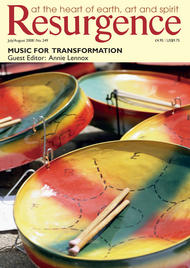EVEN IN HIS native America, Wendell Berry is not really a household name – although that, I suppose, depends somewhat on the household. In Britain, Berry’s fame, if one could ascribe such a thing to such a man, is practically non-existent – again, perhaps setting aside Resurgence readers and their kin. In both countries, however, Berry’s influence is extensive and far-reaching. Over the half-century or so that his essays, poetry and novels have been produced, Berry has quietly, but insistently, shaped the wider discussion on food, culture and community.
On a recent trip to northern New England, I stopped for lunch at the Farmer’s Diner in Quechee, Vermont, whose owners source their ingredients from the surrounding area, paying decent prices and supporting sustainable local agriculture while serving simple, tasty food. On a wall they displayed T-shirts for sale, emblazoned with the statement ‘Eating is an agricultural act’. The quotation made me smile, resonating as it did so perfectly in those surroundings, and I paused to consider whether, without the tireless work and profound insights Berry has contributed over the years, the Farmer’s Diner would exist at all – or many other such enterprises, for that matter. As Bill McKibben notes while discussing the growing local food movement in the US in his contribution to this book, “I cannot tell you how many bathrooms I have peed in while reading a framed copy of [Berry’s] ‘The Mad Farmer Manifesto’ hung above the toilet. Through sheer power of both rhetoric and example he has touched off this Restoration.”
The wonderful thing about this collection of essays is that it demonstrates just how varied and far-reaching Berry’s influence has been and how meaningful his work is to his readers in so many different ways. We have the academic Berry – the poet, the writer’s writer, the thinker. We have Berry the pacifist, Berry the radical, Berry the agrarian, Berry the citizen. The intensity and breadth of debate contained in this volume, hinged on one aspect or another of Berry’s work, is remarkable, and I cannot even begin to touch on it all here.
I must confess, however, that my favourite contributions to Wendell Berry are the personal ones: those written by close friends about the man himself, or those written by individuals deeply touched by his work. Scott Russell Sanders’ essay entitled ‘Words Address to Our Condition Exactly’ tells of how, when he was a ‘floundering’ twenty-five-year-old student, a kindly teacher gave him a copy of Berry’s Long-Legged House, and proceeds to recount just what balm it was to read something written by a man whose “aspirations had to do not with making a name or a fortune but with leading a meaningful life”. Sanders notes that he still has the same paperback copy now, tape holding together a cracked spine, the pages yellow and brittle, riddled with pen marks. A volume that has been lived in, it seems, and that is just how it should be with Berry’s work.
It is also a treat to discover some aspects of the man that cannot be gleaned from his own writings (Berry shares very little of his personal life with his readers). As McKibben points out, Berry the writer “can be awfully stern”, so learning of his raucous laugh and his penchant for a good bourbon makes him seem just a little bit more forgiving. The snippets of personal correspondence that Wes Jackson shares in his contribution make the extraordinarily hard-working Berry seem so very human. “I’m hurrying too much, doing too much, head humming like a hive,” he confesses in one such note.
Fittingly with such a collection, the joy of it is really in revisiting Berry’s own writings once more, or being introduced to works not yet encountered. Wendell Berry: Life and Work is also a reminder to join in the ‘conversation’, to take Berry’s words and put them into practice in one’s own life. As he once remarked, “Thinking is a partial act… Living is a communal act.” This is ultimately the lesson gleaned from these pages: we think; we live; we participate – and we all thank Wendell Berry for his guidance.
Natalie Moore is a freelance writer currently
living in Cambridge, Massachusetts






